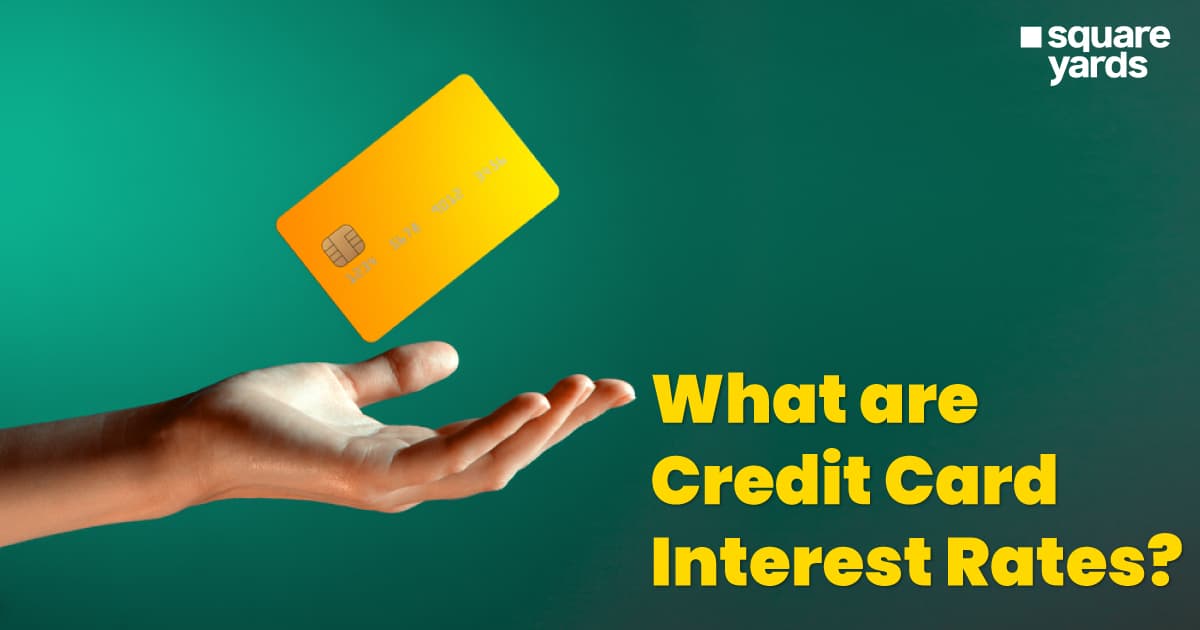- Home
- Credit Card
- Interest Rates Of Top Credit Cards
Credit Card Interest Rates - Top Banks in India

- Personalized solutions
- Expert guidance
- Application assistance
- Credit score discussion
- Interest rate comparison


Last Updated: 8 February 2026
There are two ways credit card businesses can profit. One is the credit card interest rates they impose on merchants, eateries, and other providers of products and services when you pay with your card. The interest and fees they charge you are the other. Here’s how interest on credit cards works—and how to pay less of it.
What is a Credit Card Interest Rate?
Credit card firms charge interest on one’s credit card usage. Commonly, it is stated as an annual percentage rate or APR.
Most credit cards have variable APRs, which change according to a specific benchmark, like the prime rate. Therefore, your APR will be 16% if the prime rate is 4% and your credit card charges the prime rate plus 12%. The average APR of credit cards monitored in Investopedia’s database as of June 2023 was 23.74%.
The majority of credit cards only charge interest if your balance is not paid in full each month. In that situation, your balance will be increased by the interest charge made by the credit card issuer on your outstanding balance. Therefore, if your debt is not paid in full the next month, you will wind up paying interest twice. This is how credit card balances may quickly increase and even spiral out of control.
Some credit cards have several interest rates, which makes things even more complicated. For instance, they might impose a different rate (often higher) on cash advances than they would on purchases.
Interest Rates on Top Credit Cards in India 2023
The table provides a summary of the various credit card interest rate ranges supplied by leading banks, including HDFC, SBI, Axis, HSBC, IndusInd, Kotak Mahindra, RBL, and Yes Bank while showcasing the monthly and annual percentage rates (MPR% and APR%) of the credit cards they offer.
| Credit Card | Interest Rate per month | Annual Percentage Rate (APR) |
| Axis Bank Ace Credit Card | 3.60% | 52.86% |
| SBI Card ELITE | 3.50% | 42% |
| HDFC Regalia Credit Card | 3.60% | 43.20% |
| Flipkart Axis Bank Credit Card | 3.40% | 49.36% |
| Amazon Pay ICICI Credit Card | 3.5% to 3.8% | 42% to 45.6% |
| HDFC Millennia Credit Card | 3.60% | 43.20% |
| Cashback SBI Credit Card | 3.75% | 45% |
| HSBC Cashback Credit Card | 3.50% | 42% |
| HDFC Bank Diners Club Privilege | 3.60% | 43.20% |
When is the Interest Rate Charged on Credit Cards?
When you have an unpaid balance on your account or have gotten a cash advance, your credit card interest rate might see a jump. The following circumstances could cause this:
- When you just make the bare minimal payment
- When you make a payment that is less than the full amount due
- When there is absolutely no payment
- After using your credit card to make an ATM withdrawal
Keep in mind that when you roll over unpaid balances to the following billing cycle, the interest-free period does not apply to any new purchases you make. This implies that starting on the first day, interest will be charged on new transactions.
How are Credit Card Interest Rates Determined?
As long as the balance on your credit card is unpaid in your account, your credit card interest rate is added daily. This could make the math a little more challenging. Here is an example to help you understand how your card issuer calculates interest on your credit card. Let’s make the following assumption:
| Transaction Date | 1st March, 2023 |
| Amount | Rs. 10,000 |
| The date on which the Statement will be generated | 6th March 2023 |
| The Due Amount (Minimum) | 5% of the balance which is outstanding, hence Rs. 500 |
| Due date of the Bill | 26th March 2023 |
| Interest Rate (Credit Card – Monthly) | 3% |
In the following cases, the interest rate will be determined as follows:
(i) If the cardholder paid off the entire balance on their credit card by March 26, 2023, there won’t be any interest charges.
(ii) If the user paid a portion of the balance prior to the deadline, which is March 26, 2023.
What is Credit Card Interest-free Period?
The interval between the end of a billing cycle and the payment deadline is known as the credit card interest rate-free period on credit cards. The typical interest-free term credit card companies offer users is up to 50 days. This does not imply that all transactions will have the same amount of interest-free time, though. According to the day you complete the transaction. Let’s use an illustration to assist you in grasping this:
Say your credit card’s statement date is the 20th of each month, and the bill is due on the 10th of the following month. Therefore, if you complete a transaction on the 10th of the preceding month, it will benefit from the full 50 days of interest-free time. However, you will only receive the 10-days’ worth of interest-free time if you purchase on the 10th of the current month, which is 10 days before the statement date. Similarly, the interest-free period will only last one day for a purchase made on the 19th.
However, the following situations do not fall under the interest-free period:
- Withdraw money
- If you carry over your balances to the following cycle after each transaction
How Can I Lower My Credit Card Interest Rate?
Since you may use a credit card to buy purchases now and pay them off later, credit cards are excellent instruments for leveraging your cash flow. Cards might help you stretch your money further using rewards or cash-back cards.
However, some credit cards have high-interest rates, making it costly for cardholders to carry balances.
Lowering the interest rate on your card can be helpful if you have a balance and want to prevent taking on additional debt. But how can you reduce your credit card interest rate without getting a new card?
You can bargain with your bank or credit card provider to achieve a cheaper interest rate on your card. Even though the card issuer might ultimately say “no,” being aware of these procedures could increase your likelihood of receiving a positive response.
Given below are the ways that can help an individual in lowering their credit card interest rates:
- Evaluation of the finances
- Maintain a good credit score
- Compare various offers
- Make a request with the credit card issuer
- Negotiate well
- Try and get a credit card with the facility of balance transfer
What Happens if I Miss a Credit Card Payment and My Interest Rate Increases?
There are various repercussions when credit card bills are missed or paid late. Listed below are some consequences that one might experience if they default on the payment:
- A major penalty fee is charged to your credit card.
- Negative impact on the credit card score.
- The card issuer might increase the interest rate on your existing credit card.
- Your credit limit might get reduced.
- You might miss out on the interest-free credit card period.
FAQ About Credit Card Interest Rates
Why is credit card interest so high?
In finance, one may typically expect a better and a potential reward if taking on some risk. Credit cards can be a bit risky to banks and other card issuers since many users make late or no payments. As a result, issuers charge some pretty high interest rates to blur that risk out.
Will the rate of interest for credit cards change frequently?
The variable interest rate on your credit card account is based on an index. This index rate may fluctuate from time to time. When the index changes, the bank may periodically alter your interest rate. Your account agreement specifies the circumstances under which the bank may alter your variable rate.
What is a good credit card interest rate?
Credit cards with a good APR of 20% are considered to have a good interest rate.
How can I avoid paying credit card interest?
You can avoid paying interest if you pay the entire amount. If you cannot pay off your bill debt in full, try to make a reduced payment (but not the minimum payment).
Can I negotiate my credit card interest rate?
Yes, you can negotiate your credit card interest rate with the issue.
Is 24% interest high for a credit card?
Yes, 24% interest is high for a credit card.
Is 12% interest high on a credit card?
No, 12% interest rate is not high on a credit card rather, it is a very reasonable interest rate, and very few financial institutions charge this low on credit cards.
Is 10% a good credit card interest rate?
Yes, 10% is a good and reasonable interest rate for a credit card.
